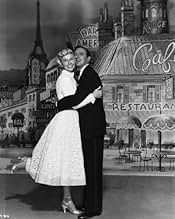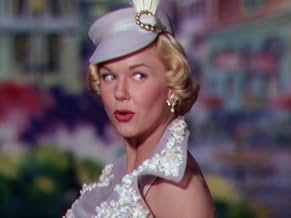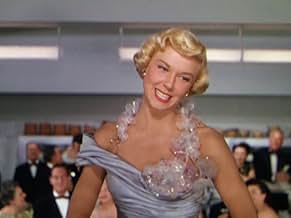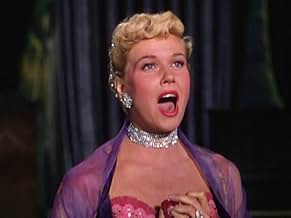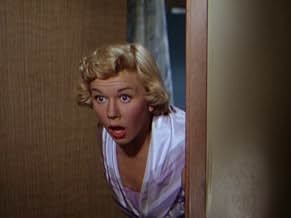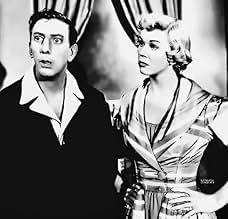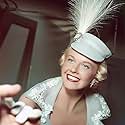IMDb RATING
5.9/10
1.5K
YOUR RATING
A series of misunderstandings leads to a chorus girl traveling to Paris to represent the American theater, where she falls in love with a befuddled bureaucrat.A series of misunderstandings leads to a chorus girl traveling to Paris to represent the American theater, where she falls in love with a befuddled bureaucrat.A series of misunderstandings leads to a chorus girl traveling to Paris to represent the American theater, where she falls in love with a befuddled bureaucrat.
Leon Alton
- Stagehand
- (uncredited)
Betty Arlen
- Young Woman
- (uncredited)
Frank Baker
- Delegate
- (uncredited)
Mary Bayless
- Ship Passenger
- (uncredited)
Mary Benoit
- Secretary
- (uncredited)
Andrew Berner
- Jacques Fouquet
- (uncredited)
Storyline
Did you know
- TriviaDoris Day wrote in her autobiography that she only encountered trouble or tension on two of her Warner Bros. movies: 'April in Paris' and Young at Heart (1954). Regarding this film, she claimed that leading man Ray Bolger and director David Butler clashed early on, with Butler accusing Bolger of trying to steal scenes away from Day. She also mentioned that being a relative newcomer to movies, she was unaware of Bolger's tricks and managed to stay out of the line of fire.
- GoofsRay Bolger supposedly flies to New York when he realizes the invitation mixup, but the plane is shown flying over the Wrigley Building in Chicago.
- Quotes
Ethel S. 'Dynamite' Jackson: It's no use, Philippe. I'm in love with the man I married. And he's not even my husband!
Philippe Fouquet: Even in Paris, that's an unusual situation.
- ConnectionsFeatured in IMDb Originals: Doris Day: In Memoriam (2019)
Featured review
Easily the worst film Doris Day ever made. She plays a brassy show girl from New York who is mistakenly invited to represent the USA at a cultural shindig in Paris. The stuff-shirt dope who made the error is played by Ray Bolger (nearly 20 years Day's senior). Neither Day nor Bolger manage to stay in character.
Title song aside, all the other songs stink. Claude Daupin occupies a dumb subplot about a Frenchman trying to get home without any money to pay for a passage on the ocean liner ... even though he's a famous impresario. Paul Harvey plays the senior US official and Eve Miller (she's terrible) plays his daughter who's supposedly engaged to Bolger.
Day and Bolger did not get along during production and it shows. Even under the best of circumstances, it's unlikely there would have been any chemistry between them. Bolger had a reputation for upstaging his fellow performers and acting like a prima donna. Having said that, it's amazing how many off-key notes he hits in his opening song-and-dance number. Painful.
Bolger had made a hit on Broadway with 1948's "Where's Charley?" and he starred in the film version the same year he made this film with Day. It was his last starring role in a film.
The cheesy sets and lackluster supporting cast add to the misery. Director David Butler, who had been an actor in silent films, directed Day in several other films with much better results. Bolger seems to be the fly in the ointment.
Title song aside, all the other songs stink. Claude Daupin occupies a dumb subplot about a Frenchman trying to get home without any money to pay for a passage on the ocean liner ... even though he's a famous impresario. Paul Harvey plays the senior US official and Eve Miller (she's terrible) plays his daughter who's supposedly engaged to Bolger.
Day and Bolger did not get along during production and it shows. Even under the best of circumstances, it's unlikely there would have been any chemistry between them. Bolger had a reputation for upstaging his fellow performers and acting like a prima donna. Having said that, it's amazing how many off-key notes he hits in his opening song-and-dance number. Painful.
Bolger had made a hit on Broadway with 1948's "Where's Charley?" and he starred in the film version the same year he made this film with Day. It was his last starring role in a film.
The cheesy sets and lackluster supporting cast add to the misery. Director David Butler, who had been an actor in silent films, directed Day in several other films with much better results. Bolger seems to be the fly in the ointment.
- How long is April in Paris?Powered by Alexa
Details
- Runtime1 hour 40 minutes
- Aspect ratio
- 1.37 : 1
Contribute to this page
Suggest an edit or add missing content



